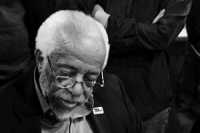Barry Doyle Harris (born December 15, 1929) is an American bebop jazz pianist and educator.
Born in Detroit, Michigan, on December 15, 1929, Barry Harris was influenced by Art Tatum, Coleman Hawkins, Bud Powell, Charlie Parker, and Thelonious Monk. Harris left Detroit for New York City in 1960. Even on a superficial hearing, Harris's playing is noted for its uncanny similarity to Bud Powell, much in the way that Sonny Stitt had a similarity to Charlie Parker.
Harris has played with Cannonball Adderley, Illinois Jacquet, Coleman Hawkins, Dexter Gordon, and Max Roach. As a lead artist, he has recorded over 14 albums.
Harris appears in the 1989 documentary film Thelonious Monk: Straight, No Chaser (produced by Clint Eastwood), performing duets with Tommy Flanagan. During the 1970s Harris lived with Monk and his family at the Weehawken, New Jersey home of the jazz patroness Baroness Pannonica de Koenigswarter, and so was in an excellent position to comment on the last years of his fellow pianist.[1]
In the Eighties, Harris maintained a unique institution, the Jazz Cultural Theater, in a former restaurant storefront on Eighth Avenue near 23rd Street in Manhattan. There he taught group music and piano lessons, as well as hosted his own performances and those of other like-minded artists. His album For the Moment was recorded there.
His approach to the teaching of jazz uses methods and techniques that pre-date the Berklee school and the Lydian Chromatic approach of George Russell. He relies upon the 6th chord and the 8-note, rather than the 7-note jazz scale, as a basis for melody and harmony. This is the material used by Bud Powell, Joseph Schillinger, George Gershwin, Glenn Miller, and even Frédéric Chopin. He emphasizes the concept of building a repertoire of one's own musical movements over common harmonic formulae.
The Jazz Cultural Theater was designed to last as long as the students and audiences kept the doors open. Unfortunately, Mr. Harris had an illness which required all his attention, and the theater closed at that time.
Since 1996 Barry Harris has collaborated with Toronto-based pianist and teacher Howard Rees in creating a series of videos and workbooks documenting his unique harmonic system and teaching process.
In 2000, he was profiled in the film Barry Harris - Spirit of Bebop.
Barry Harris continues to perform and teach worldwide. When he is not travelling, he holds weekly music workshop sessions in New York City for vocalists, students of piano and other instruments.Contents [hide] 1 Gallery 2 Selected discography 3 References 4 External links
[edit] Gallery
Photo by Brian McMillen
[edit] Selected discography Breakin' It Up (Argo 1958) Barry Harris at the Jazz Workshop (Riverside 1960) Listen to Barris Harris . . . Solo Piano (Riverside 1960) Preminado (Riverside 1961) Newer Than New (Riverside 1961) Chasin' The Bird (Riverside 1962) Luminescence (Prestige 1967) Bull's Eye (Prestige 1968) Barry Harris Trio: Magnificent (Prestige 1969) Barry Harris plays Tadd Dameron (Xanadu 1975) Tokyo (1976) Barry Harris Plays Barry Harris (Xanadu 1978) Stay Right With It (Xanadu 1978) For the Moment (Uptown 1984) The Bird of Red and Gold (Xanadu 1989) Live at Maybeck Recital Hall - Volume Twelve (Concord 1991) First Time Ever (Ecidence 1997) Live in New York (Reservoir 2002)
As a sideman: The Sidewinder by Lee Morgan (1963; Blue Note Records) Bopstacle Course by Terry Gibbs (1974; Xanadu Records) Saturday Morning by Sonny Criss (1975; Xanadu Records) Al Cohn's America by Al Cohn (1976; Xanadu Records) Eastern Sounds by Yusef Lateef (1961; Prestige Records) True Blue by Al Cohn, Dexter Gordon (1976; Xanadu Records) Silver Blue by Al Cohn, Dexter Gordon (1976; Xanadu Records) The Colossus Of Detroit by Billy Mitchell (1978; Xanadu Records) Earl May Quartet: Swinging The Blues with Barry Harris (Arbors Records)
